高二英语非谓语动词----ing形式和过去分词-人教版整理
- 格式:doc
- 大小:80.00 KB
- 文档页数:6
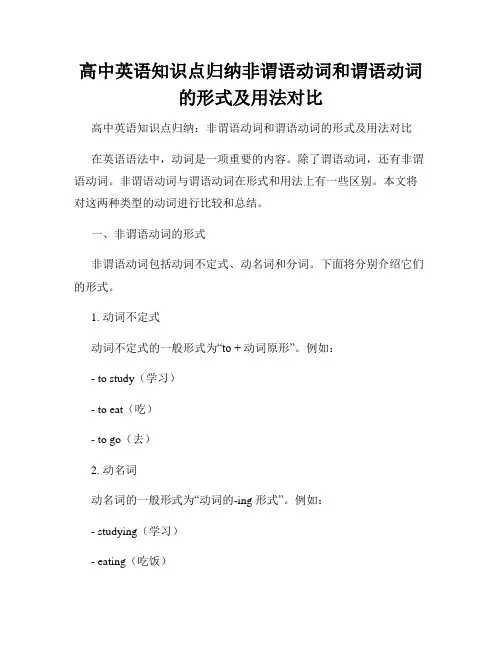
高中英语知识点归纳非谓语动词和谓语动词的形式及用法对比高中英语知识点归纳:非谓语动词和谓语动词的形式及用法对比在英语语法中,动词是一项重要的内容。
除了谓语动词,还有非谓语动词。
非谓语动词与谓语动词在形式和用法上有一些区别。
本文将对这两种类型的动词进行比较和总结。
一、非谓语动词的形式非谓语动词包括动词不定式、动名词和分词。
下面将分别介绍它们的形式。
1. 动词不定式动词不定式的一般形式为“to + 动词原形”。
例如:- to study(学习)- to eat(吃)- to go(去)2. 动名词动名词的一般形式为“动词的-ing 形式”。
例如:- studying(学习)- eating(吃饭)- going(去)3. 分词分词有两种形式:现在分词(-ing 形式)和过去分词(-ed 或 -en 形式)。
例如:- studying(正在学习)- eaten(被吃掉的)- broken(被打破)二、非谓语动词的用法非谓语动词在句子中可以充当多种不同的成分,下面将分别介绍它们的用法。
1. 动词不定式的用法- 作主语:To study is important.(学习很重要。
)- 作宾语:I want to eat an apple.(我想吃一个苹果。
)- 作补语:His goal is to win the championship.(他的目标是赢得冠军。
)- 作定语:We need a pen to write.(我们需要一支笔来写字。
)- 作状语:She woke up early to catch the train.(她早早醒来以赶上火车。
)2. 动名词的用法- 作主语:Studying is important.(学习很重要。
)- 作宾语:I enjoy listening to music.(我喜欢听音乐。
)- 作补语:Her hobby is singing.(她的爱好是唱歌。
)- 作定语:I saw a flying bird.(我看到一只在飞的鸟。


高中英语语法复习---非谓语动词-过去分词(总7页)-本页仅作为预览文档封面,使用时请删除本页-高中英语语法非谓语动词(三)过去分词非谓语动词(三)——过去分词(三)过去分词:1、过去分词的基本用法:过去分词只有一种形式,也没有主动语态,它所表示的动作是一个被动的或是已完成的动作。
过去分词在句中也可用作定语、表语、宾语或状语等成分。
过去分词在句中作某种成分时,其逻辑主语一般为该分词所表示的动作的承受者,如:(1)作定语:过去分词作定语时,如果这个分词是一个单词,就位于其修饰的名词之前,如果是分词短语,就位于其修饰的名词之后。
被过去分词所修饰的名词,就是该分词的逻辑主语,如:The stolen car was found by the police last week.(2)作表语:过去分词作表语时,表示其逻辑主语所处的状态,其逻辑主语就是句中的主语,如:The glass is broken.这个玻璃杯是破的。
注:过去分词作表语时,和动词的被动语态结构相似,但两者表达的意义不同,如:The glass was broken by my little brother.这个玻璃杯是被我小弟弟打破的。
作表语用的过去分词在许多词典中已列为形容词,如:crowded, devoted, discouraged, done, dressed, drunk, experienced, frightened, gone, hurt, interested, killed, known, learned, lost, pleased, satisfied, shut, surprised, tired, undressed, worried, astonished, broken, completed, covered等。
(3)作宾语补足语:过去分词作宾语补足语时,句中的宾语就是其逻辑主语,如:When I opened the door, I found the ground covered by fallen leaves. 注:动词have后的复合宾语中,宾语补足语如为过去分词,常表示该分词所表示的动作是由别人来执行的而不是句中主语自己来执行的,如:I had my bike repaired yesterday. 昨天我(找别人)把我的自行车给修了。
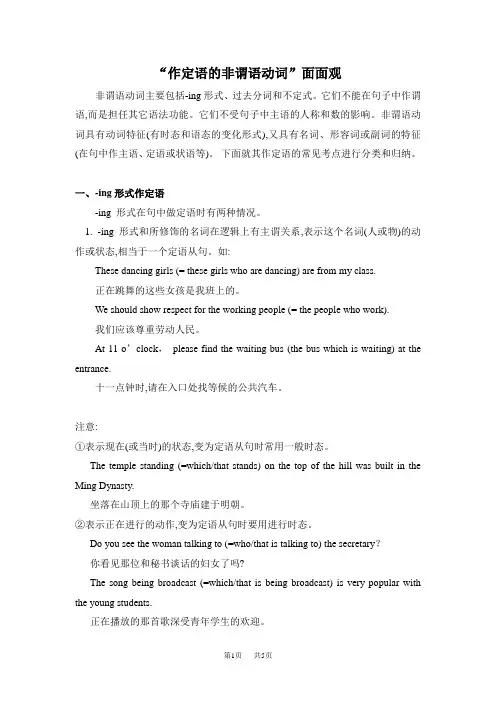
“作定语的非谓语动词”面面观非谓语动词主要包括-ing形式、过去分词和不定式。
它们不能在句子中作谓语,而是担任其它语法功能。
它们不受句子中主语的人称和数的影响。
非谓语动词具有动词特征(有时态和语态的变化形式),又具有名词、形容词或副词的特征(在句中作主语、定语或状语等)。
下面就其作定语的常见考点进行分类和归纳。
一、-ing形式作定语-ing 形式在句中做定语时有两种情况。
1. -ing 形式和所修饰的名词在逻辑上有主谓关系,表示这个名词(人或物)的动作或状态,相当于一个定语从句。
如:These dancing girls (= these girls who are dancing) are from my class.正在跳舞的这些女孩是我班上的。
We should show respect for the working people (= the people who work).我们应该尊重劳动人民。
At 11 o’clock,please find the waiting bus (the bus which is waiting) at the entrance.十一点钟时,请在入口处找等候的公共汽车。
注意:①表示现在(或当时)的状态,变为定语从句时常用一般时态。
The temple standing (=which/that stands) on the top of the hill was built in the Ming Dynasty.坐落在山顶上的那个寺庙建于明朝。
②表示正在进行的动作,变为定语从句时要用进行时态。
Do you see the woman talking to (=who/that is talking to) the secretary?你看见那位和秘书谈话的妇女了吗?The song being broadcast (=which/that is being broadcast) is very popular with the young students.正在播放的那首歌深受青年学生的欢迎。
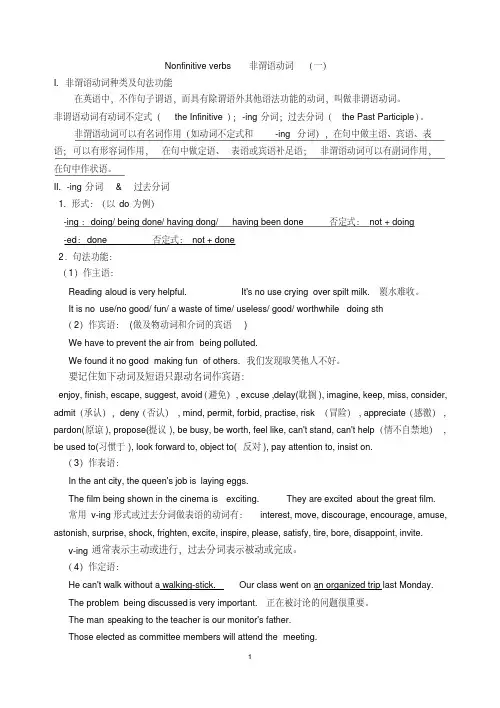
Nonfinitive verbs 非谓语动词(一)I.非谓语动词种类及句法功能在英语中,不作句子谓语,而具有除谓语外其他语法功能的动词,叫做非谓语动词。
非谓语动词有动词不定式(the Infinitive);-ing分词;过去分词(the Past Participle)。
非谓语动词可以有名词作用(如动词不定式和-ing分词),在句中做主语、宾语、表语;可以有形容词作用,在句中做定语、表语或宾语补足语;非谓语动词可以有副词作用,在句中作状语。
II. -ing分词& 过去分词1. 形式:(以do为例)-ing:doing/ being done/ having dong/having been done 否定式:not + doing-ed:done 否定式:not + done2.句法功能:(1)作主语:Reading aloud is very helpful. It's no use crying over spilt milk. 覆水难收。
It is no use/no good/ fun/ a waste of time/ useless/ good/ worthwhile doing sth(2)作宾语:(做及物动词和介词的宾语)We have to prevent the air from being polluted.We found it no good making fun of others. 我们发现取笑他人不好。
要记住如下动词及短语只跟动名词作宾语:enjoy, finish, escape, suggest, avoid(避免), excuse ,delay(耽搁), imagine, keep, miss, consider, admit(承认),deny(否认), mind, permit, forbid, practise, risk(冒险), appreciate(感激), pardon(原谅), propose(提议), be busy, be worth, feel like, can't stand, can't help(情不自禁地), be used to(习惯于), look forward to, object to(反对), pay attention to, insist on.(3)作表语:In the ant city, the queen's job is laying eggs.The film being shown in the cinema is exciting.They are excited about the great film.常用v-ing形式或过去分词做表语的动词有:interest, move, discourage, encourage, amuse, astonish, surprise, shock, frighten, excite, inspire, please, satisfy, tire, bore, disappoint, invite.v-ing通常表示主动或进行,过去分词表示被动或完成。
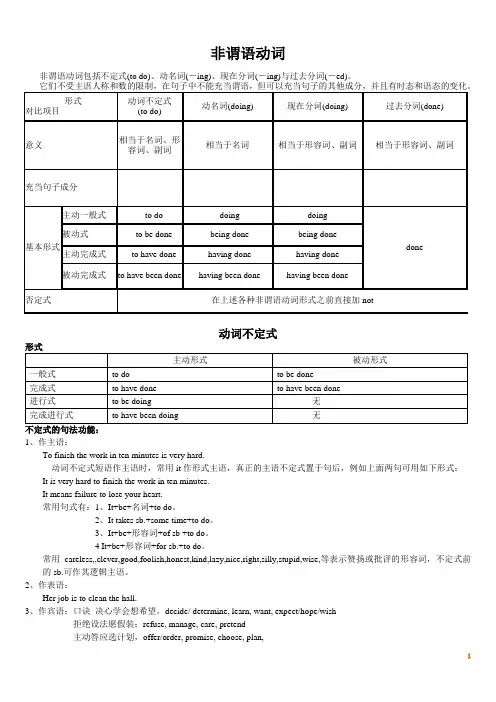
非谓语动词非谓语动词包括不定式(to do)、动名词(-ing)、现在分词(-ing)与过去分词(-ed)。
动词不定式不定式的句法功能:1、作主语:To finish the work in ten minutes is very hard.动词不定式短语作主语时,常用it作形式主语,真正的主语不定式置于句后,例如上面两句可用如下形式:It is very hard to finish the work in ten minutes.It means failure to lose your heart.常用句式有:1、It+be+名词+to do。
2、It takes sb.+some time+to do。
3、It+be+形容词+of sb +to do。
4 It+be+形容词+for sb.+to do。
常用careless,,clever,good,foolish,honest,kind,lazy,nice,right,silly,stupid,wise,等表示赞扬或批评的形容词,不定式前的sb.可作其逻辑主语。
2、作表语:Her job is to clean the hall.3、作宾语:口诀决心学会想希望,decide/ determine, learn, want, expect/hope/wish拒绝设法愿假装;refuse, manage, care, pretend主动答应选计划,offer/order, promise, choose, plan,同意请求帮一帮。
agree, ask/beg, help如果不定式(宾语)后面有宾语补足语,则用it作形式宾语,真正的宾语(不定式)后置,放在宾语补足语后面,例如:Marx found it important to study the situation in Russia.动词不定式也可充当介词宾语,如:I have no choice but to stay here.He did nothing last Sunday but repair his bike.动词不定式前有时可与疑问词连用,如:He gave us some advice on how to learn English.4、作宾语补足语:在复合宾语中,动词不定式可充当宾语补足语,如下动词常跟这种复合宾语:want, wish, ask, tell, order, beg, permit, help, advise, persuade, allow, prepare, cause, force, call on, wait for, invite.此外,介词有时也与这种复合宾语连用,如:With a lot of work to do, he didn't go to the cinema.有些动词如在使役动词make, have, let和感官动词see, watch, notice, observe, feel, hear, listen to, look at等词后接不定式作宾补,不定式不带to,表示做某事的全过程。
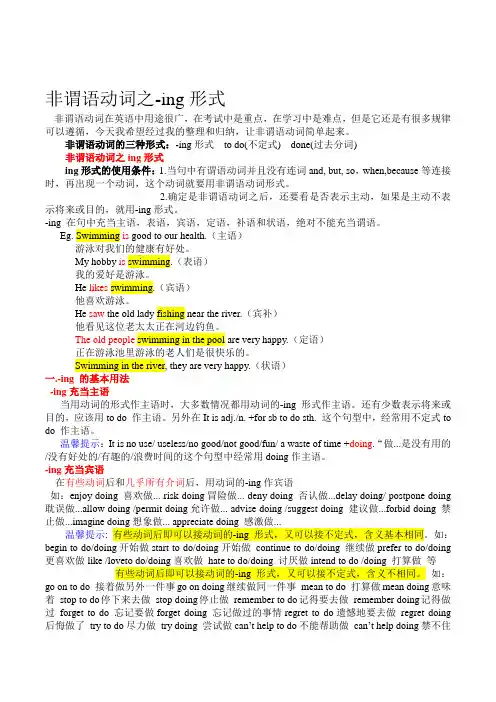
非谓语动词之-ing形式非谓语动词在英语中用途很广,在考试中是重点,在学习中是难点,但是它还是有很多规律可以遵循,今天我希望经过我的整理和归纳,让非谓语动词简单起来。
非谓语动词的三种形式:-ing形式to do(不定式) done(过去分词)非谓语动词之ing形式ing形式的使用条件:1.当句中有谓语动词并且没有连词and, but, so,when,because等连接时,再出现一个动词,这个动词就要用非谓语动词形式。
2.确定是非谓语动词之后,还要看是否表示主动,如果是主动不表示将来或目的,就用-ing形式。
-ing 在句中充当主语,表语,宾语,定语,补语和状语,绝对不能充当谓语。
Eg. Swimming is good to our health.(主语)游泳对我们的健康有好处。
My hobby is swimming.(表语)我的爱好是游泳。
He likes swimming.(宾语)他喜欢游泳。
He saw the old lady fishing near the river.(宾补)他看见这位老太太正在河边钓鱼。
The old people swimming in the pool are very happy.(定语)正在游泳池里游泳的老人们是很快乐的。
Swimming in the river, they are very happy.(状语)一.-ing 的基本用法-ing充当主语当用动词的形式作主语时,大多数情况都用动词的-ing 形式作主语。
还有少数表示将来或目的,应该用to do 作主语。
另外在It is adj./n. +for sb to do sth. 这个句型中,经常用不定式to do 作主语。
温馨提示:It is no use/ useless/no good/not good/fun/ a waste of time +doing.“做...是没有用的/没有好处的/有趣的/浪费时间的这个句型中经常用doing作主语。
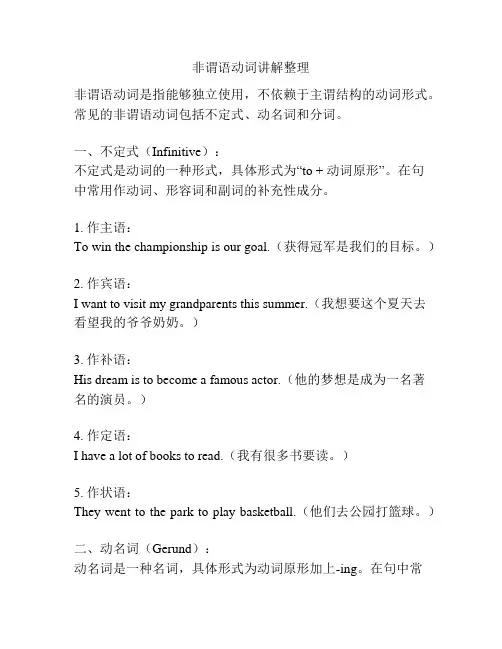
非谓语动词讲解整理非谓语动词是指能够独立使用,不依赖于主谓结构的动词形式。
常见的非谓语动词包括不定式、动名词和分词。
一、不定式(Infinitive):不定式是动词的一种形式,具体形式为“to + 动词原形”。
在句中常用作动词、形容词和副词的补充性成分。
1. 作主语:To win the championship is our goal.(获得冠军是我们的目标。
)2. 作宾语:I want to visit my grandparents this summer.(我想要这个夏天去看望我的爷爷奶奶。
)3. 作补语:His dream is to become a famous actor.(他的梦想是成为一名著名的演员。
)4. 作定语:I have a lot of books to read.(我有很多书要读。
)5. 作状语:They went to the park to play basketball.(他们去公园打篮球。
)二、动名词(Gerund):动名词是一种名词,具体形式为动词原形加上-ing。
在句中常用作名词的主语、宾语和表语。
1. 作主语:Swimming is one of my favorite hobbies.(游泳是我最喜欢的爱好之一。
)2. 作宾语:She enjoys playing the piano.(她喜欢弹钢琴。
)3. 作表语:His job is teaching English.(他的工作是教英语。
)4. 作定语:I saw a girl carrying a basket of flowers.(我看到了一个拿着一篮花的女孩。
)5. 作状语:He left the house, crying loudly.(他大声哭着离开了房子。
)三、分词(Participle):分词是动词的一种形式,分为现在分词(-ing形式)和过去分词(-ed、-en等形式)。
在句中常用作形容词和分词短语的修饰成分。
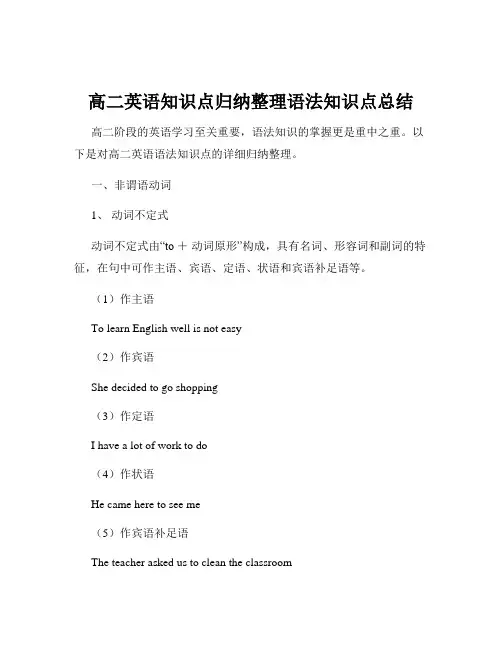
高二英语知识点归纳整理语法知识点总结高二阶段的英语学习至关重要,语法知识的掌握更是重中之重。
以下是对高二英语语法知识点的详细归纳整理。
一、非谓语动词1、动词不定式动词不定式由“to +动词原形”构成,具有名词、形容词和副词的特征,在句中可作主语、宾语、定语、状语和宾语补足语等。
(1)作主语To learn English well is not easy(2)作宾语She decided to go shopping(3)作定语I have a lot of work to do(4)作状语He came here to see me(5)作宾语补足语The teacher asked us to clean the classroom2、动名词动名词由动词原形+ ing 构成,具有名词的特征,在句中可作主语、宾语、定语和表语等。
(1)作主语Swimming is good for health(2)作宾语I enjoy reading books(3)作定语A swimming pool3、分词分词分为现在分词和过去分词。
现在分词由动词原形+ ing 构成,过去分词由动词原形+ ed 构成(不规则动词的过去分词需单独记忆)。
分词在句中可作定语、状语、宾语补足语和表语等。
(1)作定语The smiling girl is my sister(2)作状语Seeing the teacher, the students stood up(3)作宾语补足语I heard her singing in the next room(4)作表语The book is interesting二、时态和语态1、一般过去时表示过去某个时间发生的动作或存在的状态,常与表示过去的时间状语连用,如 yesterday, last week, ago 等。
I went to Beijing last year2、过去进行时表示过去某一时刻或某一段时间正在进行的动作,常与 at that time, this time yesterday 等时间状语连用。
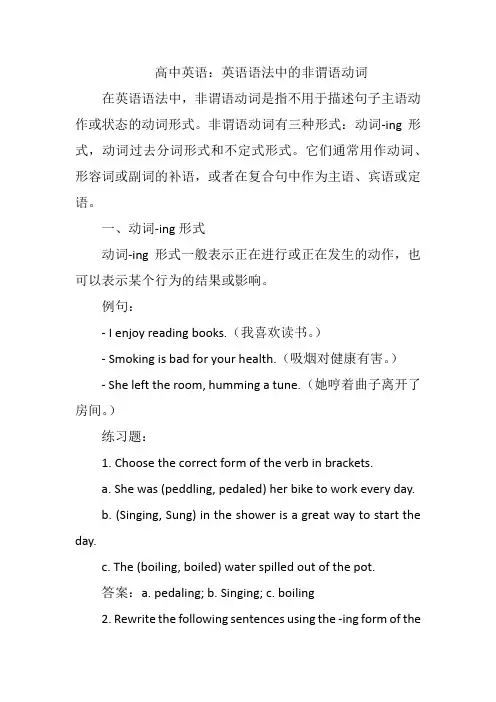
高中英语:英语语法中的非谓语动词在英语语法中,非谓语动词是指不用于描述句子主语动作或状态的动词形式。
非谓语动词有三种形式:动词-ing形式,动词过去分词形式和不定式形式。
它们通常用作动词、形容词或副词的补语,或者在复合句中作为主语、宾语或定语。
一、动词-ing形式动词-ing形式一般表示正在进行或正在发生的动作,也可以表示某个行为的结果或影响。
例句:- I enjoy reading books.(我喜欢读书。
)- Smoking is bad for your health.(吸烟对健康有害。
)- She left the room, humming a tune.(她哼着曲子离开了房间。
)练习题:1. Choose the correct form of the verb in brackets.a. She was (peddling, pedaled) her bike to work every day.b. (Singing, Sung) in the shower is a great way to start the day.c. The (boiling, boiled) water spilled out of the pot.答案:a. pedaling; b. Singing; c. boiling2. Rewrite the following sentences using the -ing form of theverbs in brackets.a. She ate breakfast and then she left the house. (walk)b. I heard a noise and I woke up. (look)c. He finished his work and then he went to bed. (read)答案:a. She left the house, walking.b. I woke up, looking around.c. He went to bed, reading.二、动词过去分词形式动词过去分词形式一般用来表示被动、完成或已经发生的动作,也可以作为形容词或状语的补语。
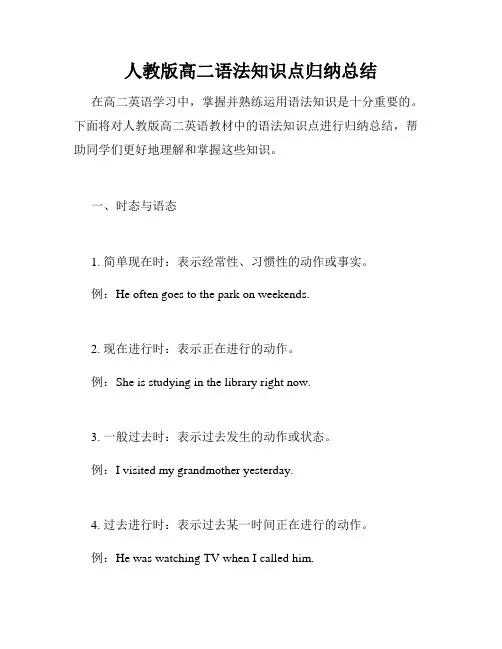
人教版高二语法知识点归纳总结在高二英语学习中,掌握并熟练运用语法知识是十分重要的。
下面将对人教版高二英语教材中的语法知识点进行归纳总结,帮助同学们更好地理解和掌握这些知识。
一、时态与语态1. 简单现在时:表示经常性、习惯性的动作或事实。
例:He often goes to the park on weekends.2. 现在进行时:表示正在进行的动作。
例:She is studying in the library right now.3. 一般过去时:表示过去发生的动作或状态。
例:I visited my grandmother yesterday.4. 过去进行时:表示过去某一时间正在进行的动作。
例:He was watching TV when I called him.5. 现在完成时:表示过去发生的动作对现在造成的影响或结果。
例:I have finished my homework.6. 一般将来时:表示将来发生的动作或状态。
例:We will have a meeting tomorrow.7. 被动语态:强调动作的承受者。
例:The book was written by Tom.二、从句1. 定语从句:用来修饰名词或代词,并起修饰作用。
例:The person who is speaking is our teacher.2. 名词性从句:起名词作用的句子。
例:I don't know what he is doing.3. 原因状语从句:表示原因的从句。
例:She failed the exam because she didn't study hard.4. 结果状语从句:表示结果的从句。
例:He studied hard, so he got good grades.5. 条件状语从句:表示条件的从句。
例:If it rains tomorrow, we will stay at home.6. 时间状语从句:表示时间的从句。
非谓语动词非谓语动词包括不定式(to do)、动名词(-ing)、现在分词(-ing)与过去分词(-ed)。
它们不受主语人称和数的限制,动词不定式定义:动词不定式是非谓语动词的一种,它没有人称和数的变化,在句子中不能独立作谓语,但它仍保持动词的特点,可以有自己的宾语和状语。
1. 不定式的一般式:一般式表示的动作或状态发生在谓语动词表示的动作或状态的同时或之后。
当不定式的逻辑主语是这个不定式所表示的动作的承受者时,不定式一般要用被动式(to be done).eg: He seemed to be tired. The building to be finished next month is for our teachers.2. 不定式的进行式:进行式表示动作正在进行,与谓语的动作同时发生。
e.g. When I went to his home, he happened to be traveling around the world.3. 不定式的完成式:如果不定式所表示的动作或状态发生在谓语动词所表示动作或状态之前,就用完成式;若是在此基础上的被动含义,就用完成被动式( to have been done).e.g. He is said to have written a novel about the Long March.He is said to have been taught French when he was a child.4. 不定式的完成进行式:如果不定式的动作是在谓语所表示的时间之前一直在进行或有可能继续进行的动作,就要用完成进行式.eg: We’re happy to have been working with the experts all the month.二、不定式的用法:1. 不定式做主语:不定式做主语一般表示具体的某次动作。
而动名词doing 表示习惯的,经常的动作。
人教版高二英语必修三知识点非谓语动词非谓语动词包括分词、动词ing和过去分词等几种形式,这是历年高考必考内容,每年都会有1-2题涉及该部分基本要素。
考点集中在:非谓语动词作定语的区别;动名词和不定式作宾语的用法比较;现在分词和过去分词的用法比较;特定句型中非谓语动词的用法等。
【高考考点透视】1.非代词动词的基本功能构成和语法功能及用法对比。
2.非谓语动词的完成式、被动式的用法和特点。
3.非谓语动词的复合结构及否定形式。
4.不定式与动名词,动名词与现在分词,现在分词与过去分词,分词作状语与相似性独立结构等用法对比。
5.不定式和动名词在及物动词后作宾语区别是考查的热点。
6.过去分词作定语,不定式和助动词作宾语补足语的用法。
7.不定式标志to和介词to的用法判断等。
8.带to与不带to的不定式的用法及区别。
考点一、考查谓语动词与非谓语动词的辨认英语应该句子至少应该包括宾语与谓语两部分,时态而少数情况下谓语都由动词来充当。
如果对限定词划分不清,把谓语动词与非谓语动词混淆,做题效果可想而知。
要克服这一毛病,关键在于正确判断、识别动词在句中是否充当谓语。
如:1.Thechildren(play)_____theviolinovertherewillgoonthestagenex tweek.根据句子结构,我们可以看出这是一个简单句。
主语是Thechildren,谓语部分是willgoonthestage,动词play显然在句中不须谓语,应用而非谓语动词形式。
依据play与它的逻辑主语children之间的主动关系以及拉小提琴动作正在进行,可以判断例举用现在分词简述定语修饰children,意为“正在那边拉小提琴的小孩”,因而正确答案为playing。
考点二、考查作状语的是非谓语动词但非的辨析作状语的非谓语动词主要考查其各种形式的辨析,即是可以选择动词不定式、现在分词还是分词作状语,不同的状语对非谓语动词的要求不同。
高中英语非谓语动词讲解非谓语动词包括不定式(to do)、动名词(-ing)、现在分词(-ing)和过去分词(-ed)。
它们不受主语人称和数的限制,不能充当谓语,但可以充当句子的其他成分,并且有时态和语态的变化。
动词不定式没有人称和数的变化,不能独立作谓语,但可以有自己的宾语和状语。
一般式表示的动作或状态发生在谓语动词表示的动作或状态的同时或之后,而进行式表示动作正在进行,与谓语的动作同时发生。
动名词相当于名词,可以作主语、宾语、表语、宾补、定语和状语。
它往往有将来意味,指经常性、惯性的动作或有现在意味。
现在分词和过去分词分别相当于形容词和副词,可以作定语和状语。
现在分词往往有进行意味,而过去分词则表示被动或完成的意义。
在上述各种非谓语动词形式之前直接加not可以构成否定式。
此外,动词不定式还有完成式、进行式和完成进行式,分别表示完成、正在进行和完成正在进行的动作或状态。
被动形式则表示该动作或状态的承受者。
需要注意的是,当不定式的逻辑主语是这个不定式所表示的动作的承受者时,不定式一般要用被动式(to be done)。
例如,The building to be finished next month is for our ___.3.关于不定式的完成式:当不定式所表示的动作或状态发生在谓语动词所表示的动作或状态之前时,使用完成式。
如果带有被动含义,则使用完成被动式(to have been done)。
例如:据说他写了一本关于长征的小说。
他据说在儿时学过法语。
4.关于不定式的完成进行式:如果不定式的动作在谓语所表示的时间之前一直在进行或可能继续进行,则使用完成进行式。
例如:我们很高兴一整个月都在和专家们一起工作。
二、不定式的用法:1.不定式做主语:不定式作主语一般表示具体的某次动作,而动名词doing则表示惯性的、经常性的动作。
具体表现为:1)不定式作主语时,谓语使用单数形式,例如:做这样的事情是愚蠢的。
高二英语知识点归纳整理语法知识点总结高二阶段的英语学习至关重要,语法知识的掌握对于提升英语综合能力有着关键作用。
以下是对高二英语语法知识点的详细归纳整理。
一、非谓语动词1、动词不定式(to do)作主语:To learn English well is not easy作宾语:She decided to study harder作宾语补足语:The teacher asked us to do our homework作定语:I have a lot of work to do作状语:He came here to see me2、动名词(doing)作主语:Swimming is my favorite sport作宾语:I enjoy reading books作定语:a swimming pool3、分词(现在分词 doing、过去分词 done)作定语:The smiling girl is my sister (现在分词)作状语:Seeing from the top of the hill, we can see a beautiful city (现在分词)作宾语补足语:I heard her singing in the room (现在分词)作表语:The window is broken (过去分词)二、虚拟语气1、虚拟条件句与现在事实相反:If I were you, I would study harder与过去事实相反:If he had come yesterday, I would have told him the news与将来事实相反:If it should rain tomorrow, we would stay at home2、虚拟语气在宾语从句中的应用wish 后的宾语从句:I wish I were a birdsuggest, insist 等动词后的宾语从句:He suggested that we (should) go at once三、定语从句1、关系代词(that, which, who, whom, whose)that 既可以指人也可以指物,在从句中作主语、宾语或表语。
高中英语语法:非谓语动词总结-大全非谓语动词的含义非谓语动词首先是一种动词形式,其次是这种动词形式不能做谓语,综合这两点,我们将其叫做非谓语动词。
非谓语动词的形式非谓语动词包含四种形式,即不定式、动名词、现在分词和过去分词。
其中,每种形式按照发生时间和主被动又包括不同的子形式。
具体如下:1. 不定式①基本形式:to do(表示主动,并且一般表示将来)②被动式:to be done(表示被动,并且一般表示将来)③进行式:to be doing (表示主动和进行)④完成时:to have done(表示主动和完成)⑤完成被动式:to have been done(表示被动和完成)⑥完成进行式:to have been doing (表示主动和完成进行)The teacher told us to do morning exercises. 老师让我们做早操。
The car to be bought is for his sister. 要买的这辆车是给他的姐姐的。
She pretended to be reading when the teacher came into the classroom. 老师进来时,她假装正在读书。
The thief is said to have escaped. 据说小偷已经逃跑了。
The thief is said to have been arrested. 据说小偷已经被抓住了。
She is said to have been working in the factory over the last 20 years. 据说在过去的20年里,她一直在这家工厂工作。
2. 动名词①基本形式:doing (表示主动)②被动式:being done(表示被动)③完成式:having done(表示主动和完成)④完成被动式:having been done(表示被动和完成)Travelling in space by ordinary people will be common in the future. 在未来,普通人在太空旅行将会是普遍的事情。
Nonfinitive verbs 非谓语动词(一)I.非谓语动词种类及句法功能在英语中,不作句子谓语,而具有除谓语外其他语法功能的动词,叫做非谓语动词。
非谓语动词有动词不定式(the Infinitive);-ing分词;过去分词(the Past Participle)。
非谓语动词可以有名词作用(如动词不定式和-ing分词),在句中做主语、宾语、表语;可以有形容词作用,在句中做定语、表语或宾语补足语;非谓语动词可以有副词作用,在句中作状语。
II. -ing分词& 过去分词1. 形式:(以do为例)-ing:doing/ being done/ having dong/having been done 否定式:not + doing-ed:done 否定式:not + done2.句法功能:(1)作主语:Reading aloud is very helpful. It's no use crying over spilt milk. 覆水难收。
It is no use/no good/ fun/ a waste of time/ useless/ good/ worthwhile doing sth(2)作宾语:(做及物动词和介词的宾语)We have to prevent the air from being polluted.We found it no good making fun of others. 我们发现取笑他人不好。
要记住如下动词及短语只跟动名词作宾语:enjoy, finish, escape, suggest, avoid(避免), excuse ,delay(耽搁), imagine, keep, miss, consider, admit(承认),deny(否认), mind, permit, forbid, practise, risk(冒险), appreciate(感激), pardon(原谅), propose(提议), be busy, be worth, feel like, can't stand, can't help(情不自禁地), be used to(习惯于), look forward to, object to(反对), pay attention to, insist on.(3)作表语:In the ant city, the queen's job is laying eggs.The film being shown in the cinema is exciting.They are excited about the great film.常用v-ing形式或过去分词做表语的动词有:interest, move, discourage, encourage, amuse, astonish, surprise, shock, frighten, excite, inspire, please, satisfy, tire, bore, disappoint, invite.v-ing通常表示主动或进行,过去分词表示被动或完成。
(4)作定语:He can't walk without a walking-stick. Our class went on an organized trip last Monday.The problem being discussed is very important. 正在被讨论的问题很重要。
The man speaking to the teacher is our monitor's father.Those elected as committee members will attend the meeting.I know the people building the house there.The house built over there is a shop. The house being built over there is a shop.boiled water_______________ boiling water__________________fallen leaves_______________ falling leaves __________________the risen sun________________ the rising sun__________________(5)作状语:表示时间、原因、结果、条件、让步、行为方式、伴随状况等, 分词的逻辑主语是隐含的,应该与句子的主语一致。
Having been told many times, the naughty boy made the same mistake. _________________ Having done his homework, he played basket-ball.__________________________________ Being a League member, he is always helping others. _______________________________ Playing all day, you will waste your valuable time. _________________________________ He dropped the glass, breaking it into pieces. ______________________________________ The teacher came into the lab, followed by some students. ___________________________ Praised by the neighbours, he became the pride of his parents. ________________________ Once seen, it can never be forgotten. ____________________________________________ Given more time, I'll be able to do it better. _______________________________________ (6)作宾语补足语:如下动词后可跟分词作宾语补足语:感官动词see, watch, hear, feel, notice, observe, listen to, look at, catch,使役动词find, keep, leave, have, get, make,另外还有with+宾语+分词结构。
在这些结构中,-ing分词做宾补说明宾语是动作的发出者,形成逻辑上的主谓关系,-ed分词做宾补,表示宾语是动作的承受者,形成逻辑上的动宾关系。
Can you hear her singing the song in the next room?I heard the song sung several times last week.They kept me waiting at the gate.She has us working day after day. They two had a wedding picture taken yesterday.I will have/get my bike repaired tomorrow.With the work done, they went out to play. 工作做完了,他们出去玩去了。
The boy lay on the grass, with his eyes looking at stars in the sky.III. Translate the phrases and rewrite the sentences with v-ing or the past participle.1. 一颗破碎的心a broken heart2. 鲁迅写的小说luxun ’s novel3. 吸毒成瘾的人_____________________4. 激动人心的消息an existing news5. 发展中国家________________________6. 发达国家_________________________7. The lecture was given by Professor Zhang. It is about the environment protection._____________________________________________________________________________8. The bike was stolen. It belongs to Jack._____________________________________________________________________________ 9. A woman is standing by the door. Who is she?_____________________________________________________________________________ 10. The room faces south. It is our room._____________________________________________________________________________ 11. When the stadium is seen from the top, it looks like a bird’s nest._____________________________________________________________________________ 12. Because she was interested in medicine, she decided to become a doctor._____________________________________________________________________________ 13. When ice is taken into a warm room, it soon changes into water._____________________________________________________________________________ 14. Although he was left alone at home, Sam didn’t feel afraid at all._____________________________________________________________________________ 15. Since I had worked hard all day, I was ready for bed by eight o’clock._____________________________________________________________________________ 16. As she felt sick, the woman sat down quickly._____________________________________________________________________________ 17. When I was walking in the street, I happened to meet my old friend._____________________________________________________________________________ 18. When he was asked what had happened, he told us about it._____________________________________________________________________________ IV. Multiple choice:1. The secretary worked late into the night, _________ a long speech for the president.A. preparedB. preparingC. to prepareD. was preparing2. The computer center, _________ last year, is very popular among the students in this school.A. openB. openingC. openedD. to be opened3. The s peaker raised his voice but couldn’t make himself _____.A. hearB. to hearC. hearingD. heard4. She’s upstairs, ____________ letters.A. writesB. writeC. writingD. to write5. _____ to the notice, Mary said, “ Can’t you read?”A. PointedB. PointingC. To pointD. Having pointed6. The visiting minister expressed his satisfaction with his talks, ________ that he enjoyed hisstay here.A. Having addedB. to addC. addingD. added7.__________more attention, the tree could have grown better.A. GivenB. To giveC. GivingD. Having given8. The murderer was brought in , with his hands ______ behind his back.A. tryingB. to be tiedC. tiedD. having tied9. The _______ look on the girl’s face suggested that she _________ such bad news.A. surprising, would expectB. surprised, should expectC. surprising, shouldn’t have been expectedD. surprised, hadn’t expected10. The girl ___ forward to buying a new gold watch.A. referred to lookB. referred to lookingC. referred to looksD. referring to looks11.When I got back home I saw a message ________ to the door, _________ “Sorry to miss you,I will come later.”A. sticking; readsB. stuck; readC. pinned; readingD. pinning; reading12. She felt rather that she shouldn’t drive the car at such a speed.A. frightening, frighteningB. frightened, frightenedC. frightening, frightenedD. frightened, frightening13. Helen had to shout __________ above the sound of the music.A. making herself hearB. to make herself hearC. making herself heardD. to make herself heard14. Don’t leave the water _____________ while you brush your teeth.A. runB. runningC. being runD. to run15. I don’t mind___ to the party.A. being not invitedB. not invitingC. not being invitedD. not to be invited16. _______ a foreign language, one must have a lot of practice.A. For masteringB. MasteringC. To masterD. So as to master17. Many teachers were praised at the meeting, Mr. Zhou ____.A. including B .being included C. to include D. included18.________her mother had come, her face lit up.A. HearingB. Having heardC. When hearingD. When she heard19. The novel is said _______into many languages.A.translatedB. being translatedC. to have been translatedD. having been translated作定语:boiled water 开水boiling water 沸水fallen leaves落叶falling leaves 正在飘落的叶子the risen sun升起的太阳the rising sun冉冉上升的太阳作状语:Having been told many times, the naughty boy made the same mistake. 尽管…(让步状语)Having done his homework, he played basket-ball. 完成…后(时间状语)Being a League member, he is always helping others. 作为…(原因状语)Playing all day, you will waste your valuable time. 如果…(条件状语)He dropped the glass, breaking it into pieces. 结果状语The teacher came into the lab, followed by some students. 伴随状语Praised by the neighbours, he became the pride of his parents. 因为(原因状语)Once seen, it can never be forgotten. 一旦…(时间状语)Given more time, I'll be able to do it better. 如果…(条件状语)Translate the phrases and rewrite the sentences with v-ing or the past participle.1. 一颗破碎的心a broken heart2. 鲁迅写的小说novels written by Lu Xun3. 吸毒成瘾的人people addicted to drugs4. 激动人心的消息exciting news5. 发展中国家developing countries6. 发达国家developed countries7. The lecture was given by Professor Zhang. It is about the environment protection. The lecture given by Professor Zhang is about the environment protection.8. The bike was stolen. It belongs to Jack.The stolen bike belongs to Jack.9. A woman is standing by the door. Who is she?Who is the woman standing by the door?10. The room faces south. It is our room.The room facing south is our room.11. When the stadium is seen from the top, it looks like a bird’s nest.Seen from the top, it looks like a bird’s nest.12. Because she was interested in medicine, she decided to become a doctor. Interested in medicine, she decided to become a doctor.13. When ice is taken into a warm room, it soon changes into water.When taken into a warm room, it soon changes into water.14. Although he was left alone at home, Sam didn’t feel afraid at all.Left alone at home, Sam didn’t feel afraid at all.15. Since I had worked hard all day, I was ready for bed by eight o’clock. Having worked hard all day, I was ready for bed by eight o’clock. 16. As she felt sick, the woman sat down quickly.Feeling sick, the woman sat down quickly.17. When I was walking in the street, I happened to meet my old friend. Walking in the street, I happened to meet my old friend.18. When he was asked what had happened, he told us about it.When asked what had happened, he told us about it.keys to multiple choice:1-5 BCDCB 6-10 CACDC 11-15 CDDBC 16-19 CDDC。